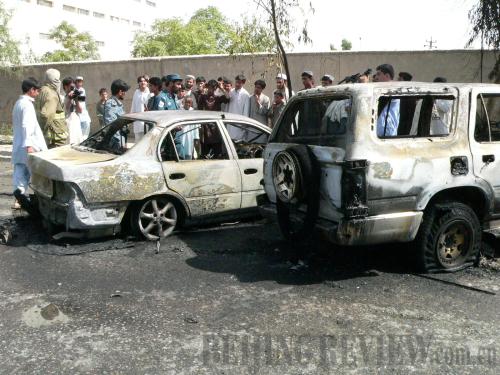|
 |
|
CHRONIC CHAOS: Local residents gather at the site of a bombing in Kandahar in southern Afghanistan on July 10. Afghanistan remains volatile despite U.S. counterinsurgency efforts (XINHUA) |

Stanley McChrystal came into the spotlight in June 2009 when U.S. President Barack Obama entrusted him with fighting America's longest war since the end of the Cold War as commander of U.S. forces in Afghanistan.
The four-star general made headlines again a year later. In an interview with Rolling Stone, McChrystal and his aides expressed disappointment with Obama, Vice President Joe Biden and the White House security team—a move that soon led to his resignation. Obama named General David Petraeus, Commander of the U.S. Central Command, as his successor.
Change of reins
McChrystal, a graduate from the renowned U.S. Military Academy at West Point, has spent most of his years of military service in the U.S. Special Forces. His career peaked when he commanded the Joint Special Operations Command forces in capturing Saddam Hussein and killing Abu Musab al-Zarqawi, leader of Al Qaeda in Iraq.
Since becoming commander of U.S. forces in Afghanistan in 2009, he advocated a shift of strategy from antiterrorism to counterinsurgency. Instead of trying to wipe out terrorists in large numbers, he focused on protecting civilians while frequently deploying Special Forces soldiers to carry out "targeted killings" of terrorist leaders—but the strategy did not make any great difference.
In recent months, terrorist attacks have increased in Afghanistan, and NATO casualties have hit record highs.
At the same time, McChrystal's tough stance hindered collaboration between U.S. forces and Afghan civilian authorities, resulting in severe military-civilian disagreements. Sluggish progress in Afghanistan, coupled with the unflattering remarks in Rolling Stone about the Obama administration, rendered his departure almost inevitable.
As his predecessor did, Petraeus graduated from West Point and rose to fame in the Iraq War. He led troops in conquering Bagdad in 2003 before being appointed commander of U.S. forces in Iraq. In that capacity, he is credited with successful efforts to forge alliances between U.S. forces and Sunni tribes, in opposition to Al Qaeda terrorists. When George W. Bush sought to resolve the Iraq quagmire through a forces build-up, Petraeus stood firmly behind the former president's decision, helping relieve him of political pressure at home.
As leader of the U.S. Central Command, a post he assumed in 2008, he not only effectively coordinated military and civilian departments, but also motivated Iraq's neighboring countries to back U.S. counterinsurgency operations. His latest appointment shows Obama places high hopes on Petraeus quickly turning things around in Afghanistan.
The change of command sparked intense speculation at a time when the war in Afghanistan had hit an impasse. Some U.S. media outlets believe the departure of McChrystal signaled a new round of policy adjustments. Some U.S. experts even called on Obama to take the opportunity to reassess Afghanistan policy.
Though he will continue to carry out the counterinsurgency strategy, Petraeus has suggested different tactics. At a Senate hearing on his nomination, he said the tough situation in Afghanistan has made it imperative for U.S. forces "bringing all assets to bear" to ensure those on the ground have all the support they need. He was addressing concerns among U.S. soldiers McChrystal's gunfire restrictions in order to limit civilian casualties in Afghanistan would put them in greater danger.
Some analysts in the U.S. military warned the leadership change might disrupt U.S. operational planning in Afghanistan. This is problematic particularly given the fact U.S. forces are running out of time to meet the deadline set by Obama to pull out of Afghanistan by July next year. Other analysts considered McChrystal a scapegoat for Obama's failed Afghanistan policy.
The sacking of McChrystal could also escalate conflict between U.S. military and civilian officials. Both Defense Secretary Robert Gates and Chairman of the Joint Chiefs of Staff Mike Mullen had recommended McChrystal for the post of top commander in Afghanistan.
The U.S. Government and military have long embroiled themselves in disputes over Afghanistan strategy. In December last year, Obama announced the United States would send 30,000 additional troops to Afghanistan. At the same time, he set a deadline for withdrawal, in a bid to address anti-war sentiment in the government.
The two-pronged policy has not eased government-military conflict. High-ranking military officials have frequently challenged the government's authority. Gates, for instance, recently defied the deadline by saying that a large-scale withdrawal by July next year has not been decided. The disagreements will likely take a toll on U.S. operations in Afghanistan.
| 